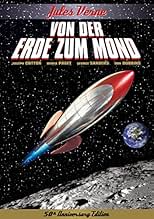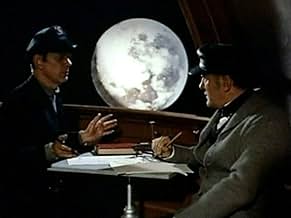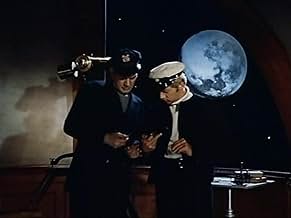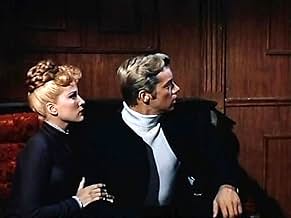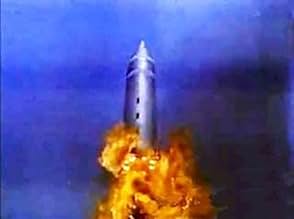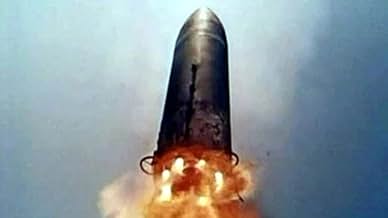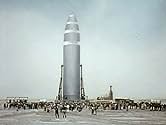IMDb RATING
5.1/10
1.9K
YOUR RATING
In 1868, American inventor Victor Barbicane develops a powerful military explosive that he also uses as fuel for a moon-bound rocket manned by himself and a motley crew.In 1868, American inventor Victor Barbicane develops a powerful military explosive that he also uses as fuel for a moon-bound rocket manned by himself and a motley crew.In 1868, American inventor Victor Barbicane develops a powerful military explosive that he also uses as fuel for a moon-bound rocket manned by himself and a motley crew.
Ludwig Stössel
- Aldo Von Metz
- (as Ludwig Stossel)
Morris Ankrum
- US President
- (uncredited)
Robert Clarke
- Narrator
- (voice)
- (uncredited)
Les Tremayne
- Countdown Announcer
- (uncredited)
Featured reviews
After the Civil War, arms inventor Victor Barbicane (Joseph Cotten) creates a super explosive he calls Power X. But he faces public opposition from steel manufacturer Stuyvesant Nicholl (George Sanders), a supporter of the Confederacy who has an irrational hatred of Barbicane. After being forbidden from using his formula by President Ulysses S. Grant, Barbicane turns to building a spaceship that will be shot to the moon by a cannon. And he needs his arch-rival Nicholl's help to do it.
I'm perplexed as to why this one is so hated on here. At first I thought maybe it was Mystery Science Theater 3000, which is often to blame when you see an older movie on IMDb with a lot of negative reviews and a lower than deserved score. But it doesn't appear this was featured on that show. Many of the reasons given in the reviews I've read here could fit a dozen other respected sci-fi films from the same era. Complaining that the movie has dated special effects? Really? The only reason I don't rate it higher myself is because it's basically 100 minutes of the rivalry and reluctant partnership between these two men with nothing much in the way of sci-fi spectacle that you expect from a movie based on a Jules Verne novel. But those men are Joseph Cotten and George Sanders, who both give charismatic performances. This wasn't challenging stuff for either actor, and both have certainly done better, but they do very well with what they're given here. Debra Paget (with dyed blonde hair) is largely wasted. Fantastic job by Morris Ankrum in his one scene as President Grant. There isn't much in the way of effects but the little bit there is has the kind of quaint charm to it that I enjoy about period sci-fi films. Like I said, I don't get the fervent hatred of this movie. It's not one of the great sci-fi films from the Golden Age, nor is it the best Verne adaptation brought to the screen, but it's not a terrible film. It's actually quite enjoyable and a good way to pass the time. Love that final corny scene. It's a good corny, in my opinion.
I'm perplexed as to why this one is so hated on here. At first I thought maybe it was Mystery Science Theater 3000, which is often to blame when you see an older movie on IMDb with a lot of negative reviews and a lower than deserved score. But it doesn't appear this was featured on that show. Many of the reasons given in the reviews I've read here could fit a dozen other respected sci-fi films from the same era. Complaining that the movie has dated special effects? Really? The only reason I don't rate it higher myself is because it's basically 100 minutes of the rivalry and reluctant partnership between these two men with nothing much in the way of sci-fi spectacle that you expect from a movie based on a Jules Verne novel. But those men are Joseph Cotten and George Sanders, who both give charismatic performances. This wasn't challenging stuff for either actor, and both have certainly done better, but they do very well with what they're given here. Debra Paget (with dyed blonde hair) is largely wasted. Fantastic job by Morris Ankrum in his one scene as President Grant. There isn't much in the way of effects but the little bit there is has the kind of quaint charm to it that I enjoy about period sci-fi films. Like I said, I don't get the fervent hatred of this movie. It's not one of the great sci-fi films from the Golden Age, nor is it the best Verne adaptation brought to the screen, but it's not a terrible film. It's actually quite enjoyable and a good way to pass the time. Love that final corny scene. It's a good corny, in my opinion.
To bad many of the comments here seem to be from jaded action film viewers. They can't seem to appreciate this films many merits including the fact it's a showcase for Cotton's and Sander's enormous talents. Talents to rarely used after their heydays in Hollywood. They both do a marvelous job here, especially Cotton. Yeah, compared to the action packed plot less junk we have today this may seem "slow" in comparison. But there is much more to this film then the gun fights, explosions, and "cool" space battles people seem to require these days. The colorful sets and the acting are a joy to see. And if you look just below the surface you'll find this a refreshing variation on the typical "horrors of atomic energy" films so popular in the 50s.
If you have an open mind and love sci-fi films that dare to be different for their time, you should enjoy this.
If you have an open mind and love sci-fi films that dare to be different for their time, you should enjoy this.
A scientist (Joseph Cotton) and a millionaire arms dealer (George Sanders) team up on the construction of a rocket to blast themselves to the Moon. This movie was based on a Jules Verne classic -- but it completely lacks the charm and the quality of `Journey to the Center of the Earth' and `20,000 Leagues Under the Sea'.
Even though the cast includes Morris Ankrum (the Grand Old Man of vintage sci-fi) to provide dignity, and Debra Paget to provide scenery (watch `Princess of the Nile' and go quietly insane), it wasn't enough to save this numbingly slow and unappealing film.
Some of the special effects are astoundingly bad, considering the fair production standards. In the scenes of the blast-off, the supporting bar which holds up the rocket model is clearly visible! Fans of `Forbidden Planet' will notice the heavy use of the `electronic tonalities' borrowed from that classic. Directed by Byron Haskins, who did both `War of the Worlds' and `The Conquest of Space'.
Even though the cast includes Morris Ankrum (the Grand Old Man of vintage sci-fi) to provide dignity, and Debra Paget to provide scenery (watch `Princess of the Nile' and go quietly insane), it wasn't enough to save this numbingly slow and unappealing film.
Some of the special effects are astoundingly bad, considering the fair production standards. In the scenes of the blast-off, the supporting bar which holds up the rocket model is clearly visible! Fans of `Forbidden Planet' will notice the heavy use of the `electronic tonalities' borrowed from that classic. Directed by Byron Haskins, who did both `War of the Worlds' and `The Conquest of Space'.
I feel tvholic's views are a bit harsh. It mustn't be forgotten that Verne wrote this in 1865 some thirty years before Wells wrote 'War of the Worlds". It must also be remembered that RKO was going broke at the time so special effects were not what they should have been. Stars Joseph Cotten and George Sanders did well with the script they had. Where this will not go down as a great sci fi movie, it is still an interesting one if for no other reason than the interplay between Cotten and Sanders.
Stories like War of the Worlds, 20,000 Leagues Under The Sea and Around the World in 80 Days have lent themselves to the use of special effects and unfortunately for this film, the film production company did not have the wherewithal to have effects in the same class as the aforementioned three.
Stories like War of the Worlds, 20,000 Leagues Under The Sea and Around the World in 80 Days have lent themselves to the use of special effects and unfortunately for this film, the film production company did not have the wherewithal to have effects in the same class as the aforementioned three.
I got a real kick out of watching the hokey special effects. A space suit with a helmet that uses screws to hold it in place, and snaps up the front? How effective is that? And the odd contraption that spins the three sea-faring astronauts, and conveniently subsides in place for the first to regain consciousness to slide out of it, then rotate his two buddies in turn to exit the mechanism. I wondered who would start the thing back in motion upon re-entry
And the gyro scope! It reminded me of Jodie Foster in Contact, where she journeys through space and time in a similar invention. The extensive use of wood puts Starship Voyager to shame, and the lack of zero gravity (drinking wine to celebrate take off) is downright amusing.
But what really made the movie work for me, was the poetic language as Virginia Nicholl Debra Paget) realizes they are all going to die. We could live to we are really old, and die quietly in our sleep, but how much better to go out as star, a blazing star, for all the world to see! To which Barbicane replies, that if he ever gets back to Earth alive, he will make sure all future voyages will include a woman, for hope. How could they possibly have foreseen the catastrophic re-entry into Earth's atmosphere by Space Shuttle Columbia in February 2003? Where not just one but two women, Commander Laurel Clark and Dr. Kalpana Chawla joined five men in instant death. Sure, the parallels to Power X and atomic warfare were already obvious in 1958, but the simplistic plot tells a whole lot more. To quote a great man, 'The cause in which they died will continue. Mankind is led into the darkness beyond our world by the inspiration of discovery and the longing to understand. Our journey into space will go on.'
But what really made the movie work for me, was the poetic language as Virginia Nicholl Debra Paget) realizes they are all going to die. We could live to we are really old, and die quietly in our sleep, but how much better to go out as star, a blazing star, for all the world to see! To which Barbicane replies, that if he ever gets back to Earth alive, he will make sure all future voyages will include a woman, for hope. How could they possibly have foreseen the catastrophic re-entry into Earth's atmosphere by Space Shuttle Columbia in February 2003? Where not just one but two women, Commander Laurel Clark and Dr. Kalpana Chawla joined five men in instant death. Sure, the parallels to Power X and atomic warfare were already obvious in 1958, but the simplistic plot tells a whole lot more. To quote a great man, 'The cause in which they died will continue. Mankind is led into the darkness beyond our world by the inspiration of discovery and the longing to understand. Our journey into space will go on.'
Did you know
- TriviaSome of the music is actually the "electronic tonalities" created by Louis Barron and Bebe Barron for Forbidden Planet (1956).
- GoofsDespite dire warnings of death should occupants of the projectile NOT be in the "acceleration tubes" upon launch, no explanation is offered as to why Virginia isn't turned to goo by stowing away in another room.
- Crazy creditsOpening credits are on the pages of a book, with the leads' photos included above the name.
- ConnectionsReferenced in Trumbo (2007)
- SoundtracksElectronic Tonalities
(uncredited)
from Forbidden Planet (1956)
composed by Bebe Barron and Louis Barron
heard during the scenes on board the rocket
- How long is From the Earth to the Moon?Powered by Alexa
Details
- Release date
- Country of origin
- Language
- Also known as
- Von der Erde zum Mond
- Filming locations
- Production companies
- See more company credits at IMDbPro
- Runtime
- 1h 41m(101 min)
- Aspect ratio
- 1.85 : 1
Contribute to this page
Suggest an edit or add missing content


